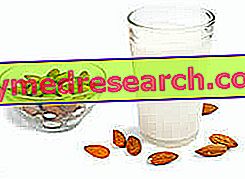Types of plant milks and role in the diet
Vegetable milks are competitive foods of cow's milk; these are totally different products compared to the excretory fruit of the breast, however, vegetable milks find a fairly widespread consumption among those who, for physical reasons (intolerances or allergies) or philosophical (for example veganism), do not consume animal milk.
The most widespread and consumed plant milks are:
- Soy milk »Video Recipe to do it at home
- Rice milk »Video Recipe to make it at home
- Almond milk »Video Recipe to make it at home
- Oat milk »Video Recipe to make it at home
- Coconut milk »Video Recipe to make it at home
- Amaranth milk »Video Recipe to do it at home
- Hazelnut milk »Video Recipe to make it at home

Indications
Recalling again that (in a balanced diet) cow's milk DOES NOT NEED replacement with plant milks, which are instead chosen for their pleasantness (subjective) or for ideological reasons; having said that, it is also worth mentioning that the choice of an alternative product could also be partially justified by one or more pathological or paraphysiological conditions; the most frequent are:
- Lactose intolerance
- Allergy to cow's milk proteins
- Hypercholesterolemia
In fact, plant milks do NOT contain lactose, do NOT contain cow's milk proteins and do NOT contain cholesterol; however, this does not mean that they are hypoallergenic foods! In fact, soy protein is one of the most widespread allergies, and in any case there is no lack of disturbance to almonds or oats (less frequent to rice).
Nutritional peculiarities
Let us begin by pointing out that, in the absence of pathologies, POCO IMPORTA if vegetal milks provide unsaturated fats and are free of cholesterol and lactose; moreover, even in a cholesterol-lowering therapy or in the treatment of lactose intolerant it is possible to insert cow's milk by managing (if necessary) the level of skimming or preferring a milk with high digestibility (milk delattosate). The same cannot be said about allergic to milk proteins who should choose TOTALLY hydrolyzed animal milks (in which ONLY amino acids and NOT peptide chains are present); but this, in my opinion, would be a useless forcing.
However, we mention the "exclusive" composition of plant milks; for example, in soy milk there are very useful cholesterol-lowering nutritional molecules, lecithins. It is therefore deducible that consuming soy milk instead of cow's milk could benefit from its cholesterol-lowering "optimization" (but the same cannot be said of rice or almond milk); however, soy is not the only legume to contain lecithin, therefore consuming other similar products could give the same nutritional advantage without having to necessarily choose a vegetable milk.
Another nutritional component strongly present in soy milk, and less in cow's milk, is the omega-3 essential fatty acids. Finally, in my opinion decidedly superfluous, the fibrous component dissolved in plant milks; in fact, modest amounts of dietary fiber are present which (obviously) are not found in cow's milk. However, it is certainly not the fiber contained in plant milks that contributes significantly to the achievement of the "famous" 30g / day.
NB . ALL plant milks, to vaguely resemble cow's milk, must be supplemented with some nutrients. The nutritional principles (micronutrients) deficient by definition are calcium, vitamin D and vitamin B12, while from the macronutritional point of view, an addition of sucrose or glucose in almond milk is highlighted, but also sunflower oil in oat milk and in that of rice.
Having said that, wanting to make a nutritional comparison of the products listed above, I would omit to mention mineral salts and vitamins since, through fortification (integration of plant milks with vitamins and minerals), they can reach (more or less) the same concentrations as cow's milk ; on the contrary, macromolecules can be significantly different from each other, and the nutritional comparison between plant milks and cow's milk could reveal the appropriateness of one beverage compared to the others.
Comparison between plant milks and cow's milk
(in red the highest values and in green the lowest ones)
| Nutritional values | Cow milk | Vegetable milks | |||
| WHOLE UHT | SOYA MILK | ALMOND MILK | RICE MILK | AVENA'S MILK | |
| Energy (KCal) | 63 | 32 | 51 | 70 | 47 |
| Proteins (g) | 3.3 | 2.9 | 1 | 0.3 | 1.4 |
| Lipids (g) | 3.6 | 1.9 | 2.3 | 1.0 | 1.6 |
| of which saturated (g) | 2:11 | 0.4 | 0.6 | 0.1 | 0.3 |
| of which monounsaturated (g) | 1.1 | - | 1.3 | 0.3 | - |
| of which polyunsaturated (g) | 00:12 | 1.3 | 0.4 | 0.6 | - |
| Glucidi (g) | 4.7 | 0.8 | 6.6 | 15 | 6.6 |
| of which simple (g) | 4.7 | 0.8 | 2.9 | 7 | 5.2 |
| of which complexes (g) | 0 | traces | 3.7 | 8 | 1.4 |
| Cholesterol (mg) | 11 | 0 | 0 | 0 | 0 |
| Fiber (g) | 0 | traces | 0.3 | 00:03 | 0.8 |



